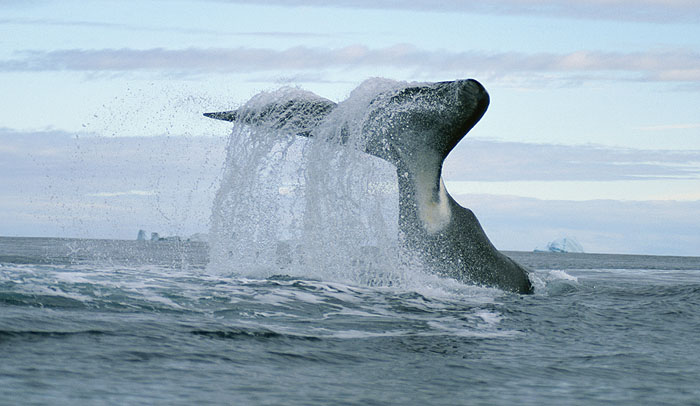This summer, WWF is helping support two expeditions that will take on some of the world’s most difficult waters, to see first-hand the effects of Arctic climate change. One expedition is sailing across the top of Russia, a journey of 6000 nautical miles through the Northeast Passage, while another is attempting a west to east transit of the Northwest Passage, also by sailing boat, a journey of about 7,000 nautical miles.
Tom Arnbom of Sweden was on the ‘Explorer of Sweden’ though the Northeast Passage, as was WWF Arctic Programme Director Neil Hamilton for much of the trip, replaced near the end by WWF polar bear coordinator Geoff York. On the ‘Silent Sound’ Cameron Dueck of the Open Passage Expedition is filing regular stories from the Northwest passage. Come back for photos and stories throughout the summer, and follow the progress of the boats as they follow in the wake of some of history’s most intrepid explorers.
By Geoff York

File photograph of a bowhead whale. Photo: WWF/Paul Nicklen, National Geographic Stock
It was a bouncy night as we pushed our way into a head wind, especially for the two of us in the bow! I have a digestive biscuit and coffee to start the watch then take an interview via satellite phone with the Guardian newspaper. Modern technology is truly amazing.
The winds settle and swing to the stern mid-shift. At 2 AM, in the midst of a beautiful sunrise, we decide to set the sails and are able to maintain 5 knots for about an hour before losing the breeze. We are seeing noticeably more bird life as we change watch and head to our bunks for some sleep.
I awaken to a great deal of activity and it seems everyone is moving about. We are in calm seas and Niklas is taking full advantage. The generator is running, fresh water is being made for the tanks, the cabin is vacuumed, people are taking showers, and we are all able to do some laundry. Soon there is clean laundry hung all over the boat to dry.
The morning watch also had some good news: they sighted a group of about 6 bowhead whales, including a mother and calf heading east. Though we seem to be in the same waters, something imperceptible has changed. Along with the whale sighting, we have the constant company of birds now as we near the edge of the Chukchi sea.
Another clue to the increased productivity of these waters is clear on the charts. From this point forward, we will encounter several small villages where Chukchi people have lived for generations. They chose these areas for access to fish and wildlife, but indigenous villages were noticeably absent from the Laptev and East Siberian seas.
This part of Chukotka is also an area of focused activity for WWF. In the next three days we will attempt landings at the villages of Ryrkaipiy and Vankarem, home of our original Polar Bear (or ‘Umky’ in Chukchi) Patrol efforts. WWF also played a role in establishing the Wrangel Island Nature Preserve to our north and continues to support their conservation efforts today.
The Chukchi sea has experienced more ice loss, more quickly, than anywhere in the Arctic. It was also one of the first places to see the direct impacts of this ice loss to people and wildlife. Walrus and polar bear began appearing on shore and at times of the year that were previously uncommon. Walrus established huge new rookeries in places where they had not been seen before.
In the shallow waters of the Chukchi sea, the sea ice ecosystem supplies the raw material for the rich benthic, or bottom-dwelling, fauna such as clams and other invertebrates. It is this bottom life that sustains bearded seals and large numbers of pacific walrus. As the sea ice has receded past the shelf and into the deep waters of the arctic basin, the walrus have abandoned the ice for land. As female walrus and calves are limited in their swimming distance, this seriously shrinks their available feeding areas. On shore they are also more prone to disturbance, stampede mortalities, harvest, and impacts from potential oil spills.
Walrus haul outs also attract polar bears that are stuck on shore. Although polar bears have little success in preying on healthy adult walrus, they can take calves. They also feed on carcasses of natural and stampede-caused mortalities. In the cases of Vankarem and Ryrkaipiy, the haul outs are also right next to the villages, causing concern for disturbing the walrus and also bringing bears right into town.
I will tell you more about the Umky Patrols, and their grass roots solutions to these problems tomorrow.
